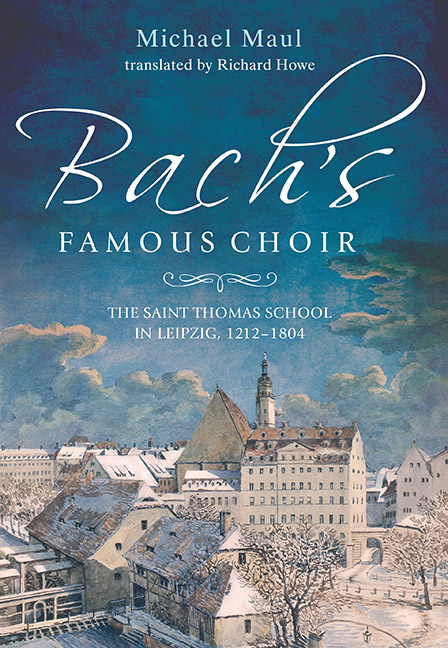Book contents
- Frontmatter
- Dedication
- Contents
- List of Plates
- Author's Note on the English Edition
- Translator's Note
- Preface
- Organization of the St. Thomas School in the 17th and 18th centuries
- Introduction
- I From Monastery to Municipal Music School, 1212–1593
- II How the St. Thomas School Became a Music School, 1594–1640
- III ‘Famous Throughout the Whole World of Music’, 1640–1701
- IV ‘Odd Authorities with Little Interest in Music’: the St. Thomas School in Crisis, 1701–1730
- V School for Scholars or ‘Conservatory of Music’? An ongoing conflict, 1730–1804
- Appendices
- Endnotes
- Bibliography
- Index of Persons
V - School for Scholars or ‘Conservatory of Music’? An ongoing conflict, 1730–1804
Published online by Cambridge University Press: 04 April 2019
- Frontmatter
- Dedication
- Contents
- List of Plates
- Author's Note on the English Edition
- Translator's Note
- Preface
- Organization of the St. Thomas School in the 17th and 18th centuries
- Introduction
- I From Monastery to Municipal Music School, 1212–1593
- II How the St. Thomas School Became a Music School, 1594–1640
- III ‘Famous Throughout the Whole World of Music’, 1640–1701
- IV ‘Odd Authorities with Little Interest in Music’: the St. Thomas School in Crisis, 1701–1730
- V School for Scholars or ‘Conservatory of Music’? An ongoing conflict, 1730–1804
- Appendices
- Endnotes
- Bibliography
- Index of Persons
Summary
Good times for cantors: Johann Matthias Gesner's rectorate (1730–1734)
On June 6, 1730, the elders’ council met at the town hall to deal with the vacancy in the St. Thomas rectorate. Applications and recommendations had been received in great numbers. The last of these candidates, presented by Mayor Born, was the rector of the Ansbach Gymnasium, Johann Matthias Gesner (plate 51). In Born's eyes, Gesner was most qualified candidate – above all because the highestranking princely-electoral education official in Saxony, the president of the superior consistory, Heinrich Count von Bunau, would ‘praise him highly’. Gesner had been ‘informed of the conditions at the school here’ and he had promised to accept the office ‘if he were called to it legitimately’. Of course, if the Ansbach rector were to be hired, it would still be necessary to ‘ensure’ that he would accept ‘no profession’, i.e., no parallel office at the university. Christian Gottlieb Jocher, who would later be famous as a lexicographer, was also still being considered as a more or less equally qualified candidate.
The first of the mayors to vote, Mayor Lange, rejected Mayor Born's candidate. He spoke emphatically in favor of Jocher or the conrector of the St. Thomas School, Hebenstreit, who was lauded on all sides, but had been declared unelectable on account of his deficient authority. The third mayor, however, Adrian Steger, jumped in to support Mayor Born. Since Hebenstreit ‘had not won the school's respect’, Steger preferred Gesner ‘most of all’, especially since the president of the superior consistory had already ‘written to Ansbach on his behalf’. In the end, all the other town council members voted for Gesner, a unanimity of opinion that also dominated the plenary session of the three councils two days later. Once again Born referred to Count von Bunau, who had praised Gesner's knowledge of foreign languages. In addition, he stressed that the agreement with the new rector regarding his not accepting a professorship at the university had to be written in such a way that Gesner would have to give up his position at the school immediately in the event of his accepting a call from the university.
- Type
- Chapter
- Information
- Bach's Famous ChoirThe Saint Thomas School in Leipzig, 1212–1804, pp. 209 - 294Publisher: Boydell & BrewerPrint publication year: 2018
- 1
- Cited by



